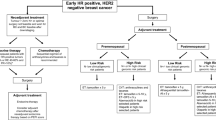Summary
In general, the translation of advances in biomedical research into innovative and personalized approaches for cancer treatment is rising on the agenda of translational and clinical cancer research, biomedical industries and healthcare systems around the world. Cancer therapies are changing, gradually moving away from the administration of cytotoxic drugs towards specific therapies that are targeted to each tumour. To facilitate this shift, molecular tests need to be developed to identify those patients at risk who require therapy and those who most likely benefit from certain therapies.
Similar content being viewed by others
References
Rhodes DR, et al. Molecular concepts analysis links tumors, pathways, mechanisms, and drugs. Neoplasia, 9: 443–454, 2007
Park JW, et al. Rationale for biomarkers and surrogate end points in mechanism-driven oncology drug development. Clin Cancer Res, 10: 3885–3896, 2004
Trusheim MR, et al. Stratified medicine: strategic and economic implications of combining drugs and clinical biomarkers. Nature Rev Drug Discovery, 6: 287–293, 2007
Compton C. Geeting to personalized cancer medicine. Taking out the garbage. Cancer, 110: 1641–1643, 2007
van't Veer LJ, et al. Gene expression profiling predicts clinical outcome of breast cancer. Nature, 415: 530–536, 2002
Paik S, et al. A multigene assay to predict recurrence of tamoxifen-treated, node-negative breast cancer. N Engl J Med, 351: 2817–2826, 2004
Wang Y, et al. Gene expression profiles to predict distant metastases of lymph node-negative primary breast cancer. Lancet, 365: 671–679, 2005
Ma KJ, et al. The HOXB13:IL17BR expression index as a prognostic factor in early stage breast cancer. J Clin Oncol, 24: 4611–4619, 2006
van de Vijver M, et al. A gene-expression signature as a predictor of survival in breast cancer. N Engl J Med, 347: 1999–2009, 2002
Desmedt C, et al. Strong time dependence of the 76-gene prognostic signature for node-negative breast cancer patients in the TRANSBIG multicenter independent validation series. Clin Cancer Res, 13: 3207–3214, 2007
Buyse M, et al. Validation and clinical utility of a 70-gene prognostic signature for women with node-negative breast cancer. J Natl Cancer Inst, 98: 1183–1192, 2006
Sparano JA. TAILORx trial assigning individual options for treatment (Rx). Clin Breast Cancer, 7: 347–350, 2006
Mook S, et al. Individualization of therapy using MammaPrint: from development to the MINDACT trial. Cancer Genomics Proteomics, 4: 147–155, 2007
Author information
Authors and Affiliations
Corresponding author
Rights and permissions
About this article
Cite this article
Gastl, G. Approaching personalized cancer medicine. memo 1, 121–123 (2008). https://doi.org/10.1007/s12254-008-0046-x
Received:
Accepted:
Issue Date:
DOI: https://doi.org/10.1007/s12254-008-0046-x




